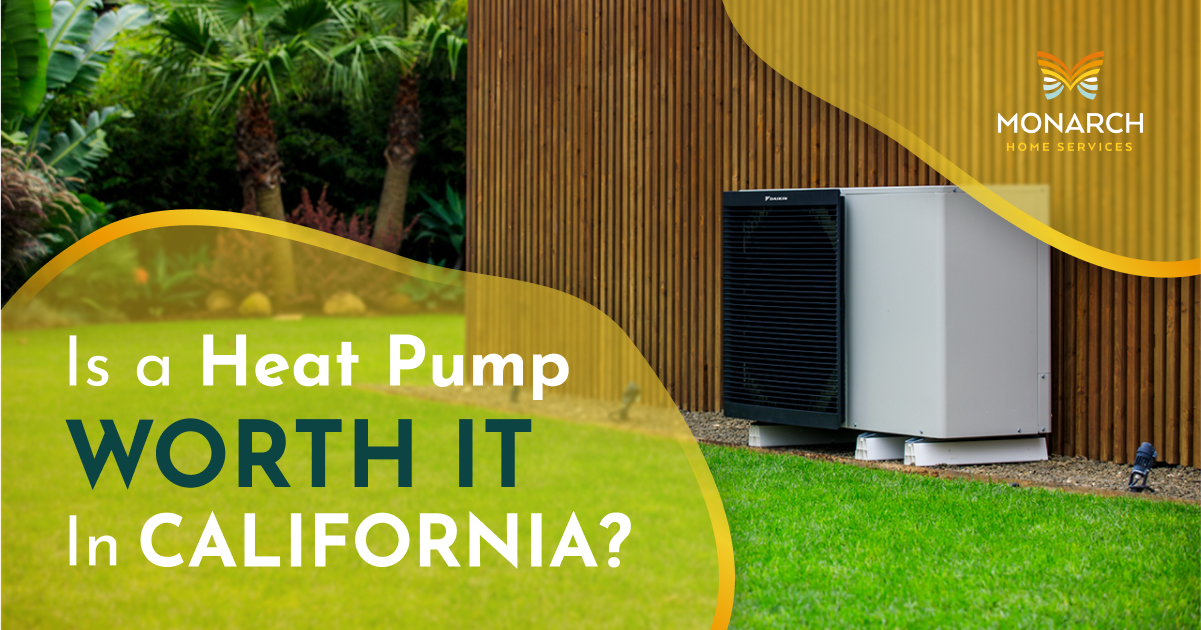
A heat pump can be a worthwhile investment in Central California. In the San Joaquin Valley, summers are generally very hot and winters are relatively mild. Many homeowners switch between their air conditioners and furnaces for much of the year. But with heat pump installation, you can have one unit that provides both heating and cooling.
How Do Heat Pumps Work?
Heat pumps are ideal for moderate climates, in which they work most efficiently. They differ from air conditioners in that they can reverse the flow of refrigerant. By changing the mode, you can go from effective heating to receiving cool air, or vice versa.
The system absorbs, transfers, and releases heat rather than producing it. This process saves a great deal of energy. In cooler weather, the heat pump extracts heat from outdoors, where there’s enough heat to absorb even if it feels relatively cool. The system can then transfer this warmth to inside your home. It can reverse in the summer, so heat is absorbed from the air in your home and transferred outdoors to provide efficient cooling.
Why Is a Heat Pump Suited for California’s Climate?
Standard heat pumps don’t work effectively in temperatures below 35℉. Homes in colder climates can still have heat pumps but require a backup heat source such as a furnace (however, some more advanced technologies allow newer heat pumps to operate in colder weather). Central California’s climate is generally moderate compared to most other parts of the country. Extreme cold and freezing temperatures are rare, making a heat pump a worthwhile investment.
Should I Install a Heat Pump Now?
If your existing HVAC system is meeting your needs, you don’t have to rush into getting a heat pump. But it’s not a bad idea to start planning if:
- Your HVAC System Is Aging: A heat pump costs more than an AC or furnace alone. If either your air conditioner or furnace is declining, you may want to replace it with another one. But if your entire HVAC system needs replacement, a heat pump is more cost-effective.
- You Use a Gas-Fired Furnace or Heater: Natural gas costs less than electricity, and heat pumps require electricity to run. If your gas-fired furnace is in good shape but your cooling system isn’t, installing a new AC system can be a better choice.
- Your Electric Furnace Is Failing: If your electric furnace is near the end of its life and so is your air conditioner, installing a heat pump can help you save. While costlier upfront than an AC or furnace, it’s less expensive to install than both combined. A heat pump is also much less expensive to operate than an electric furnace.
- You Qualify for Tax Credits/Rebates: The Inflation Reduction Act of 2022 provided homeowners with incentives to invest in heat pumps and other eco-friendly upgrades. You could claim an up to 30% tax credit and save as much as $2,000 on a heat pump. The program also created rebate programs that will be available to income-eligible households.
- Your Local Utility Company Offers Incentives: Depending on your utility company, incentives for upgrading to a heat pump or other high-efficiency appliance can range from hundreds to thousands of dollars. Check with your local utility for available incentives and whether your home qualifies.
What Are the Benefits of a Heat Pump?
Heat pump installation has become more commonplace in recent years. It’s an opportunity to replace your aging heating and cooling equipment, save energy, and make your home more eco-friendly. Other benefits of having a heat pump include:
- Space Savings: Heat pumps conserve space. You won’t need room for an air conditioning unit and furnace. They are also more aesthetic than most other HVAC units.
- Improved Comfort: Heat pumps are more effective at maintaining the desired temperature and humidity levels in your home. They also heat and cool a room more quickly.
- Installation Options: Installing the outdoor and indoor units and connecting them with refrigerant lines is relatively easy. Most heat pumps are air-source systems. But we can also install geothermal heat pumps that draw heat from ground sources.
- Ductless Options: Mini-split heat pumps are designed for homes without air ducts, while reverse chillers circulate hot or cold water using radiant floor systems.
- Improved Indoor Air Quality/Safety: Heat pumps don’t produce smoke, ash, or fumes. They are also highly effective at filtering and purifying the air of dust, smoke particles, and mold spores. There are no heat, fire, or carbon monoxide hazards.
How Much Does a Heat Pump Cost?
The average cost of heat pump installation in the U.S. is under $6,000. A high-end installation can cost closer to $8,000. That’s typically less than the combined cost of an air conditioner and furnace. A furnace can cost up to $6,800, and ACs can cost thousands of dollars to install.¹ Able to meet your year-round heating and cooling needs in California, a heat pump is worth it.
Schedule Heat Pump Installation with Monarch Home Services
We provide heat pump services throughout Central California. You can benefit from a unit that provides heating and cooling, does not require burning fuel, and reduces utility costs. In addition, temperature and humidity control are improved. Heat pumps are ideal in regions where winter temperatures rarely fall below 40℉, so they are worth it for homeowners in Fresno, Bakersfield, and throughout the San Joaquin Valley. To learn more, call (661) 215-6428.
Source:

